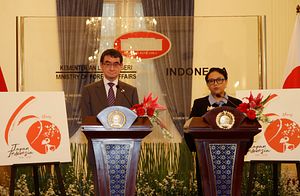Japan will help build fishing port facilities on Indonesia’s remote islands, including on the southern edge of the South China Sea. The 2.5 billion yen ($23 million) grant was confirmed during a trip to Jakarta by Japan’s Foreign Minister Taro Kono, who agreed with his Indonesian counterpart, Retno Marsudi, that the two countries would enhance cooperation in a range of fields.
The June 25 meeting was billed as the sixth Strategic Dialogue between Indonesia and Japan. The ministers witnessed the signing of an exchange of notes “to increase cooperation in the development of fisheries centers in six outer islands of Indonesia in Biak, Moa, Morotai, Natuna, Sabang and Saumlaki,” said a summary published by the Indonesian government.
Japan’s Ministry of Foreign Affairs confirmed the grant aid was intended to develop the fishing market and port facilities on those islands, describing it as an example of cooperation within the context of Japan’s Free and Open Indo-Pacific Strategy.
Kono and Marsudi also agreed to “synergize the Indonesian-initiated Indo-Pacific concept with the concept of Free and Open Indo-Pacific Strategy from Japan, through strengthening bilateral cooperation and strengthening cooperation through regional mechanisms,” the Indonesian statement said. Both ministers further “expressed concern over the occurrence of militarization in the South China Sea region” and spoke about expectations that negotiations on a code of conduct could be completed in the near future, it added.
Meanwhile, Chinese and other foreign fishing vessels continue to operate illegally near Natuna, on the southern edge of the South China Sea, according to a report by Kyodo News. In a related development, the Japan Coast Guard has dispatched its patrol vessel Tsugaru for a month-long patrol to Indonesia and the Philippines to deter piracy in Southeast Asia. The trip will include combined exercises with Indonesian Coast Guard agencies on July 11.
“We are making efforts to contribute to the realization of free, open, and safe Indo-Pacific water based on the rule of law through this mission,” the Japan Coast Guard said in a statement. “The realization for a free, open and safe maritime order based on the rule of law against threats to the safety of the sea, including pirates is essential to peace, stability and prosperity of the region.”
Kono’s trip to Indonesia – his first since becoming foreign minister – and the Tsugaru‘s port call coincide with the 60th anniversary of the establishment of diplomatic relations between Japan and Indonesia. Kono said he felt “overjoyed” to be able to visit Indonesia and noted that many commemorative events were being implemented to mark the milestone, while Marsudi pledged to work with him to further develop bilateral relations.
“Indonesia and Japan are not just strategic partners. We are also two important strategic countries in the region,” Marsudi said, per Kyodo News. “Our partnership contributes not only to the prosperity to the people of Indonesia and Japan, but also to regional peace, stability and prosperity.”
The pair “confirmed that they will continue their bilateral cooperation in fields such as politics and security, cooperation for economic prosperity, and exchanges and education,” said a summary posted by the Japanese government.
With Japan rated as the second-largest investor in Indonesia, the meeting canvassed economic and trade and investment issues. Figures indicate that trade between Japan and Indonesia reached about $33 billion in 2017, reflecting an increase of 13.5 percent from the previous year. Kono and Marsudi “agreed to explore the possibility of making Indonesia a production base for Japanese manufacturing products aimed at the third markets, including markets in ASEAN countries,” said the Indonesian statement. They backed the importance of a mutually beneficial outcome in the current review of the Indonesia-Japan Economic Partnership Agreement.
North Korea continues to be a diplomatic priority for Japan, and Kono underlined the need for Kim Jong Un’s regime to “take concrete actions” flowing from the historic summit with U.S. President Donald Trump in Singapore. “We reaffirmed our commitment to the strict implementation of the U.N. Security Council’s resolutions and to press North Korea for complete verifiable and irreversible dismantlement of all weapons of mass destruction and ballistic missiles of all ranges,” Kono said. He also explained Japan’s position on the need to resolve the issue of North Korea’s past abduction of Japanese nationals in the 1970s and 1980s.

































